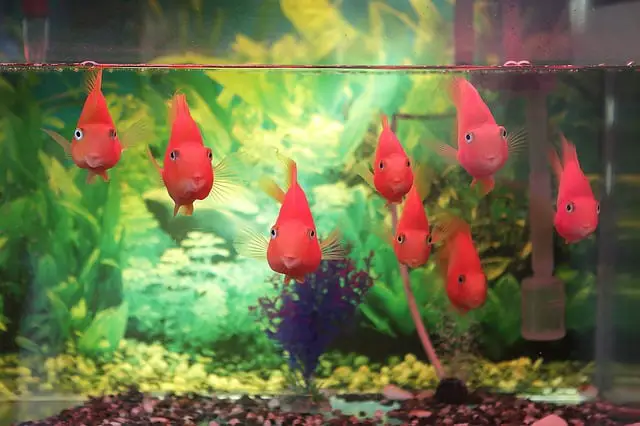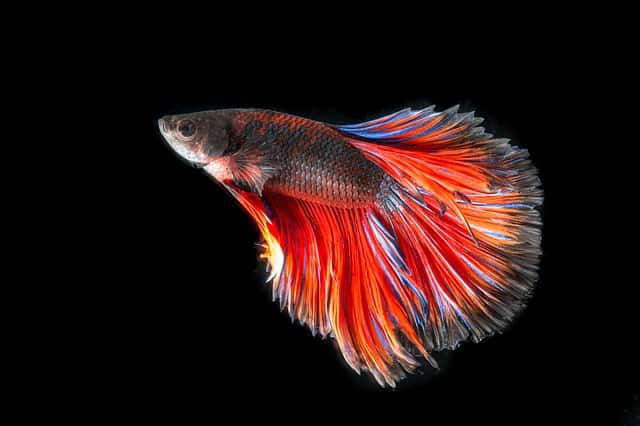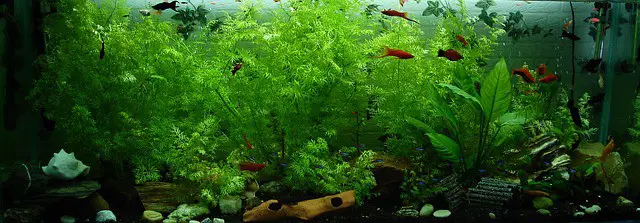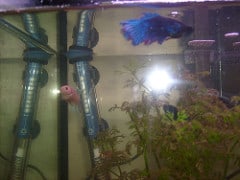If you’re just starting out in the aquarium hobby and not sure whether to run a freshwater or a saltwater tank, this article is for you! I’ll do my best to be unbiased on this topic as I have had both freshwater and saltwater tanks and although I have more experience with salts, I don’t really favor one over the other.
Freshwater aquariums are easier to start with than a saltwater aquarium. Freshwater fish can be cheaper to purchase and there is typically more selection in local fish stores. As well, larger tanks are often required for saltwater setups, however, Nano tanks are gaining popularity at a rapid rate.
So, it’s easy for me to just say a freshwater aquarium is easier to begin with because of my own knowledge and experience in the hobby. The truth is that saltwater tanks really aren’t harder, there are just a few more steps required to successfully maintain a marine tank, which I’ll explain in this article.
So, if you’re ready to learn more about the differences between freshwater and saltwater tank, then let’s get to it!
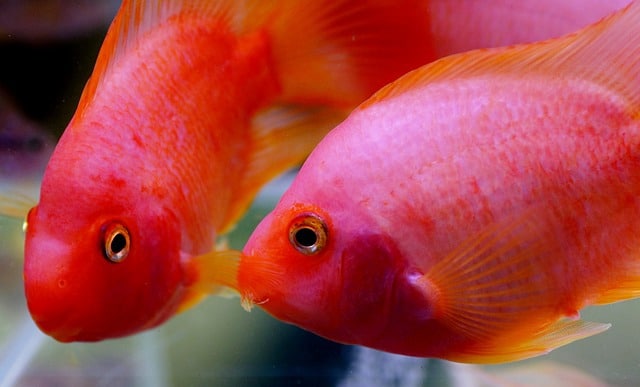
What are the Costs to Start up a Freshwater or Saltwater Aquarium?
Aside from the time commitment involved in taking care of pets for the duration of their lives, the most important part of being a fish owner is the cost of the initial setup with purchasing equipment and then fish and then of course the maintenance costs and fish replacements.
For this section, I will talk about equipment similarities and some equipment specific to either freshwater or saltwater tanks.
Fish Tanks
Aquariums can be pricey, especially if you go with an acrylic tank. That said, an acrylic tank is much nicer to look through than a glass tank. The main thing to consider here with tanks and freshwater vs saltwater is that typically saltwater fish will require a larger aquarium than freshwater varieties.
Of course, there are now Nano tanks that you can get for both freshwater and saltwater fish that are quite small and harder to maintain. If you’re just starting out, I would recommend getting some fish tank experience under your belt before you try a Nano tank.
If you can get your hands on a used tank, I would recommend it if you’re just starting out. There’s nothing wrong with that and you can get used aquariums for as little as half the price, of brand new ones.
Fish Tank Equipment
Your fish tank won’t work unless you have all the equipment to make it successful so let’s talk a bit about what you will be needing on top of the tank. You’re going to need filtration, lighting, and a heater. There are other pieces of equipment you can purchase as well but those three are the essentials.
Filtration
Filters can cost you anywhere from $30 to hundreds of dollars. What’s important to know about filtration is it is cheaper to filter a freshwater aquarium than a saltwater aquarium.
With freshwater, you can get away with a less robust filter and still have a thriving tank – provided the filter is able to circulate water and hopefully promote beneficial bacteria growth because of the filter medium you are using that’s all you will need. I have had great success using an Aquaclear HOB filter on 55-gallon freshwater tanks for years.
For a freshwater tank around 55 to 75 gallons, you don’t have to spend more than $100 on a filter, if you don’t want to.
For a saltwater tank, that’s another story. Saltwater aquariums thrive with more water circulation and more robust filtration. If you’re buying a larger tank, then you will want to invest in a canister filter and spend as much as you can afford.
Canister filters seem to last forever and are well worth the money. You can also add things like inline UV lights to help combat algae and parasites or you can add an inline heater if you want.
A good canister filter will cost you $200 or more for a saltwater tank.
Lighting
In general, the cost to light a freshwater vs a saltwater tank will be about the same if we are comparing the same size tanks. Don’t let anyone try to upsell you on lighting because you are setting up a saltwater aquarium. With today’s LED lights they are more than bright enough for a fish only saltwater tank.
The times you will need special lighting requirements for freshwater or saltwater tanks are as follows:
Freshwater tanks require different (more expensive) lighting when you start adding live plants. You want to ensure you are offering the fill light spectrum that the sun provides to give your plants have the best chance at growing.
Saltwater tanks need better lighting if you want live rock and corals. Contrary to popular belief, you don’t need anything other than bright lights for a fish only marine tank. Today’s LED lights on the market will suffice for saltwater fish.
With today’s technology, aquarium lighting can be purchased with fun effects such as shimmering effect, lightning or storm mode, moonlight lighting which is almost standard in most newer LED lights. Higher end lights have timers and Wi-Fi connectivity.
Unless you are putting live plants or corals in your tank, you shouldn’t have to spend more than $100 or so on lighting – unless, of course, you want lights with all the bells and whistles, then the skies the limit for price.
Heaters
Heating a tank is very straightforward and there isn’t much difference in heating a freshwater vs a saltwater tank. The heat settings in either tank based on what you want to keep in the tank will be different. That’s about it! The cost of a heater should be identical regardless of which tank you set up.
There are other pieces of equipment you can purchase to help you have a healthy and happy tank. For a saltwater tank, you might want to set up a sump tank which is essentially another tank where you keep equipment and monitor water conditions. It helps keep your main (or display) tank free of equipment.
A protein skimmer may be a piece of equipment you might end up purchasing for a salt tank down the road. A UV filter and power heads can be used on a saltwater or a freshwater tank.
Aside from what’s already been mentioned, a CO2 kit might be required – if you start filling a freshwater tank up with live plants. Co2 feeds live freshwater plants.
My overall assessment of which is better when it comes to the cost of freshwater or saltwater is that a freshwater tank could cost you a bit less to start up for equipment, Yet, I don’t think it’s enough to really scare away anyone who might be interested in a salt tank.
The Cost and Availability of Fish for Freshwater VS Saltwater
When it comes to buying fish to stock your freshwater or saltwater tank, which is better?
In general, freshwater fish will be cheaper if you stick with smaller fish. Larger freshwater fish like cichlids can start to get expensive.
Unless you live in a coastal area, you’ll most likely pay quite a bit for saltwater fish – meaning if you live more inland, then the price you pay for a clownfish will be more than what someone pays closer to a shoreline.
It’s not just that, it’s also because they’re closer to the ocean where a lot of saltwater fish breeders are based out of. Freshwater breeders, on the other hand, seem to be just about everywhere theses days.
I don’t think it’s going to be a big surprise to you that saltwater fish will cost more.
What does this have to do with which is better? I think it’s better, if you don’t have to pay as much for your fish and this also speaks to availability. Freshwater fish are more readily available (at least where I live) so that makes freshwater the better option in this case.
Maintenance for Freshwater and Saltwater Aquariums (Which is Better?)
Maintenance on freshwater and saltwater aquariums is almost identical. You clean the inside of the glass/acrylic, perform a water change, clean filtration.
For water changes, I would say from my own personal experience a freshwater tank is a bit more work because I do them almost weekly. I find my freshwater tanks are more heavily stocked with fish and live plants. Therefore, they need more frequent water changes.
For saltwater, I perform a water change once every 4 weeks and top up with RO water in between the changes. It’s just less work.
With the saltwater tanks and needing to use RO water, I end up going outside the home to purchase it. This is obviously more work than treating tap water for the freshwater tanks. If I had a RO system in my home, then hands down the salt tank would be easier to maintain.
I have to call a draw on this one. Freshwater and saltwater are about equal in the effort they take to maintain. So, neither is better when it comes to maintenance.
I do check the water parameters more often in the saltwater aquarium, although that only takes 5 minutes every weekend.
Are Freshwater or Saltwater Fish easier to Take Care of?
I know you are thinking to yourself it’s saltwater that is harder to take care of. The fact is that I have had some clownfish that seemed to survive well past their typical 5 YR lifespans.
I think what it boils down to here is the choice of fish will determine which is better. The right thing to do is choose fish that have a reputation of being easy to care for if you are a beginner.
As you gain more experience and knowledge in the hobby, you will want to try more exotic fish, maybe.
Conclusion
In conclusion, I thought it would be a good idea to tally the results of each section above.
Cost of equipment – years ago, saltwater tanks were the most expensive choice in almost every category. Nowadays, the cost to get setup is almost identical. Freshwater tanks narrowly win this section.
Cost of fish – no matter where you live, freshwater fish will be a bit better priced than saltwater fish. If you live near breeders and the ocean, you will pay a bit less than if you live more inland. Freshwater wins this section as well.
Maintenance – I am going to declare this section a tie. It takes work to keep a successful tank, regardless of what kind it is. If I had to lean one way, however, I feel saltwater takes a bit less work, believe it or not.
Ease of care – for ease of fish care, it all boils down to which fish you have chosen. Are they hardy fish? This section is a tie as well.
The tally based on the information I have provided declares that a freshwater tank has a slight advantage when it comes to being better vs a saltwater tank.
That said, as far as which is better between a freshwater tank and a saltwater tank, the only person that can decide that is you. I have given you my thoughts on the topic. You might fancy a tank filled with a huge school of neon tetras or you may prefer an even larger tank with blue and yellow tangs! The choice is yours.
Hopefully, this article has been of help to you. Thanks for reading and good luck.
Related Posts
How to Make a Freshwater Tank Look Like a Saltwater Tank
HOB VS Canister Filter – Which is Best for You?
Can I Convert My Freshwater Tank to Saltwater?
The Best New Fish Tank Checklist for Beginners



